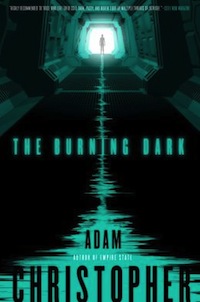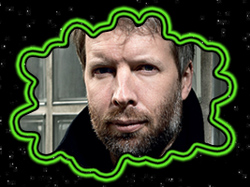Welcome back to The Pop Quiz at the End of the Universe, a recurring series here on Tor.com featuring some of our favorite science fiction and fantasy authors, artists, and others!
Today we’re joined by novelist and comic writer Adam Christopher. Born in New Zealand, he has lived in Great Britain since 2006. In 2010, as an editor, Christopher won a Sir Julius Vogel award, New Zealand’s highest science fiction honour. His debut novel, Empire State, was SciFiNow’s Book of the Year and a Financial Times Book of the Year for 2012. Christopher’s latest novel, The Burning Dark, is available March 25th. Read an excerpt here on Tor.com!
Join us as we cover subjects ranging from lost cosmonauts to robot detectives, and more!
Describe your favorite place to read or write.
Our house has a library—it seemed better use of the space than as a dining room!—and I try to spend as much time in there as possible. There’s nothing better while reading, or writing, than to be surrounded by books.
What’s your favorite method of procrastination?
Twitter. I’m an internet junkie. There, I said it. That’s the first step, right?
I also have a thing for making lists. Oh man, nothing beats turning to a fresh, clean page in a notebook, taking out a nice pen, and starting a list. There’s so much potential there. So much to do, so little time! So hey, why not spend some of that time making a list. Number it. Connect apparently disparate items with little arrows. Make sublists. Item breakdowns.
See, I can write lists all day. Which is possibly why I hardly ever manage to tick all the items off one…
Strangest thing you’ve learned while researching a book?
One of the weirdest things was actually something that inspired The Burning Dark in the first place. There’s an urban legend that Yuri Gagarin wasn’t the first man in space, but the first who came back alive. Allegedly the Soviets sent up other cosmonauts before him, but each was killed in space and their mission—their very existence—covered up.
In the early 1960s, two Italian radio enthusiasts picked up mysterious signals apparently from these Soviet capsules, and recorded the last moments of several “lost cosmonauts”—one of whom, “Ludmilla,” reports to ground control as her capsule burns in orbit. The original recording is extremely creepy and very sad, although there is really no indication of what the recording is of, or even what language she is speaking.
On one hand it’s just a scary myth about space exploration… until you remember that the Soviets made a lot of people quite literally disappear, even doctoring photographs to delete them from all historic record. The idea that they were trying to hide the failures of their space program, too, suddenly doesn’t seem so far-fetched.
In The Burning Dark, Captain Cleveland, stuck on the partially dismantled space station Coast City, picks up a very strange transmission on his space radio…
 If you had to choose one band or artist to provide the official soundtrack to your upcoming book, who would it be?
If you had to choose one band or artist to provide the official soundtrack to your upcoming book, who would it be?
The Burning Dark needs a certain kind of soundtrack—something dark and moody, electronic, weird. One of my favourite bands is Ladytron, and I think they’d fit the bill quite well. Ladytron have evolved quite a lot since their debut album came out in 2001, but they shift easily from glittering synth pop to drone-filled wall-of-sound epics. Their unique mix of electronica, new wave and shoegaze would be perfect.
What D&D character alignment best describes you first thing in the morning?
Lawful neutral—mostly because I like routine, and lawful neutral sounds like my kind of alignment. This love of routine means I’ve managed to train myself to get up immediately when my alarm goes off without really thinking about it—doesn’t mean I’m good for anything other than taking a shower and drinking tea in the morning, but hey, small victories and all that.
What was your gateway to SF/Fantasy, as a child or young adult?
Reading and writing were part of my life from a very early age—from about six I was Doctor Who fan fiction at school, slightly odd mash-ups of the episodes I was watching on TV, which at the time (in mid-Eighties New Zealand) starred Jon Pertwee.
So Doctor Who was my primary gateway, both on TV and in books. I pretty much have Terrance Dicks to thank for my love of the written word.
At the same time, I was being read the Asterix books by my dad, while in class we worked through things like The Chronicles of Narnia. A little later I discovered David Eddings and the Dragonlance Chronicles, and then, thanks to my dad’s impressive bookcase of classic SF, the likes of Isaac Asimov and Arthur C. Clarke.
Name your three favorite fictional villains of all time.
My three favourite villains:
1. Root, from Person of Interest. Root—played by Amy Acker—is the creepiest, scariest, most dangerous villain I’ve seen. Always calm, always—with the help of The Machine—in control. She’s a computer genius (as a kid she finished Oregon Trail in record time) and a stone cold killer.
2. The Joker. There are so many versions and interpretations of who the Joker is and what he can—and can’t—do, but my favourite is Mark Hamill’s portrayal of him in Batman: The Animated Series. In way, the Joker is like Root—an entirely unpredictable psychopath, equally likely to hand you $1,000 in cash or shoot you through the eye. When the Joker is done right, he’s terrifying.
3. The Master. Like The Joker, there are several versions of the Master in Doctor Who. My favourite is the original, as played by Roger Delgado—suave, charming, with an intellect to match the Doctor’s and a taste for the theatrical. He’s what every moustache-twirling diabolical mastermind should be!
If you could find one previously undiscovered book by a non-living author, who would it be? Why?
Raymond Chandler’s secret science fiction epic. He famously hated science fiction and, to prove his point that it was nonsense (“They pay brisk money for this crap?”), he wrote a little bit of flash SF in a letter to his agent in 1953. Thing is, it’s actually not bad—okay, it doesn’t make any sense and it’s only 152 words he dashed out without much thought, but it has a rhythm to it that is unmistakably Chandler’s. Even in jest he couldn’t help himself, it seems. Reading the letter now is a strange experience as this mock even uses, by complete coincidence, the word “Google” in a way that we’d recognize today, 50 years later.
So here’s my theory thing: he clearly—secretly—loved SF, and obviously wrote a series of novels starring a robot detective. He then burnt all the manuscripts and complained to his agent about the trash kids are reading today and went on writing his noir masterpieces. But what he didn’t realize is that his housekeeper had managed to save one of discarded manuscripts from the from the grate in his study.
Raymond Chandler and robots? It would be brilliant, of course.
[Editor’s Note: One of these lost manuscripts has indeed been discovered and will appear exclusively on Tor.com! Look for Chandler’s robot detective in “Brisk Money” on July 23rd!]










